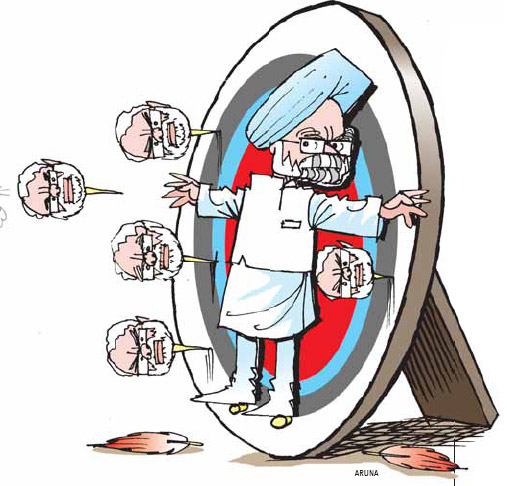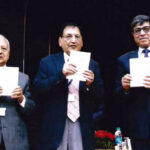Modi: Sat Sri Akaal, Sardar Sahib. I hope you are well.
Manmohan: I am as all right as you permit me to be, Modiji.
Modi: I am sorry to hear a trace of anger in your reply, Manmohanji. I thought I had treated you
rather well.
Manmohan: Well, if you call the contrived release of belated disclosures by retired civil servants good treatment…
Modi: This is a free country, sir. Everyone is free to write his memoirs. Do you hold me responsible for their sensational trash?
Manmohan: You call these books sensational trash? I thought you or your aides had a hand in facilitating their publication at politically strategic moments.
Modi: Not at all, Manmohanji. I think you have misread my character a little. I thought you would have noticed that all my barbs were directed elsewhere.
Manmohan: I do not wish to sound persistent. But why should Baijal, of all people, choose me as the main target and bring me within the direct line of fire?
Modi: I am sorry that I do not know Mr Baijal as well as you do. You might be better able to judge his motives. Let me make it clear. I do not waste my ammunition where there is no enemy target. And I do not see you as an enemy target.
Manmohan: I thought you knew of the unwritten rule which forbids a straight hit at your predecessor.
Modi: Of course, I am well aware of it. If I had not, would you be an honoured guest today at 7, Race Course Road?
Manmohan: For that I am indeed grateful. I think you have restored my self-respect to some extent. You have also started a guessing game in the media as to what the real purpose of today’s meeting is.
Modi: Let them speculate. They will never guess the real motive. I had to camouflage the whole thing by calling Deve Gowda also. The result was that he went to sleep like the Dormouse in the Mad Hatter’s tea party and I also enjoyed a well-earned nap!
Manmohan: What is the real motive? I must confess I am a little confused myself.
Modi: At the end of this conversation, I shall ask you to guess. But I have suddenly realised that I have been singularly remiss in my hospitality. I have not asked you what you would like. Chai? Lemon juice? Or something else?
Manmohan: I think chai will do.
Modi: What kind? Do you take sugar in your tea?
Manmohan: I will have a light Darjeeling tea with one cube of sugar, please.
(Modi rings a bell and gives instructions)
Modi: Now, sir. The media thinks you are giving me instructions on various things. Let us fulfil their heart’s desire. My first question: What did you think was my greatest mistake during the past one year?
Manmohan: Shall I be frank? I think this room is bugged.
Modi: You are right. You had yourself installed the device. But the device is deactivated for this conversation. I myself am keen that it should be off the record. Please be blunt and forthright.
Manmohan: I take your word for it. If you ask me for my frank opinion, I must tell you that your greatest blunder so far is that you do not have a Readily Available Natural Scapegoat to take the rap for your mistakes and misdemeanours.
Modi: And you had?
Manmohan: Isn’t it obvious? Have I been personally blamed for anything? The myth that was assiduously spread was that I was incapable of taking decisions. All the major ones were taken elsewhere.
Modi: You mean?
Manmohan: Obviously, I mean…
Modi: How do you call it a myth? Was it not the bald, unadulterated truth? At least, that is what the entire country still believes. You are supposed to have earned a number of lucrative pensions from the UN and its agencies. You believe in simple living. In fact, you are said to possess the original 1985 Maruti car.
Manmohan: All very true, but an elaborate facade. I may have had humble beginnings. I may have occasionally studied my books by the light of a street lamp. But I am not an absolute dunce.
Modi: You mean all this was like my chaiwallah myth?
Manmohan: Is your chaiwallah a myth? It has already passed into folklore. What did your father actually do for a living? Was he a veritable seth who owned a chain of tea stores across the railway stations of Western India? (Modi purses his lips and smiles)
Manmohan: You are not telling?
Modi: No. But we have been told again and again that Madam took all the decisions. In fact, the received wisdom is that you were incapable of taking any decisions.
Manmohan: Come on. I am internationally known as a modest man. But even I would like to claim that the economic recovery programme of 1991 was masterminded by me.
Modi: People do give you the credit for reforms. But that is because Narasimha Rao was wholly allergic to taking decisions.
Manmohan: So he was, so he was. What do you think changed when Madam came to power?
Modi: Well, it is generally believed that decision-making shifted from the Prime Minister to
the Chairman of the National Advisory Council.
Manmohan: Nonsense. Madam knew nuts about governance. When had she held even a petty office like that of a peon?
Modi: But your confidant, Sanjay Baru, has averred that Pulok Chatterji used to discuss all the files with Madam, before obtaining orders. And you just signed on the dotted line.
Manmohan: Confidant, my foot! All our aides are basically time-servers. I sacked Sanjay in 2008 and so he cooked up a story.
Modi: Maybe you have something there. So you think I should have a scapegoat?
Manmohan: Absolutely. More than one, I would say. Mind you, in Amit Shah you have the perfect fall guy for your electoral reverses.
Modi (smiles broadly): Thank you. Yeah, I think that was a good choice. He even looks like a second grade Don in a C-grade Bollywood movie. Any suggestions about the other scapegoats?
Manmohan: You have spread your net so wide you will need a string of scapegoats. One won’t suffice.
Modi: Who do you think fits the bill?
Manmohan: Some are naturals. For example, you can use Sushma Swaraj for external affairs. Instead, you sacrificed the Foreign Secretary. That was a mistake. You should never antagonise the bureaucracy. They are the most powerful trade union east of the Suez.
Modi: What do you think generally about my treatment of the bureaucracy?
Manmohan: You have rightly forged a direct nexus with the Secretaries. You have thus weakened the Ministers.
Modi: So you think that was sound strategy?
Manmohan: Yes, but sacking the Foreign Secretary was a big mistake. Rajiv Gandhi’s decline began when he dismissed the Foreign Secretary.
Modi : What else?
Manmohan: Your comments about bureaucrats wasting time on playing golf or bridge was a big error. These are minor vices and you should let them indulge their
little foibles.
Modi: As you know, I speak plainly and bluntly. My elocution is perfect. But is this safe?
Manmohan: In these days of TV cameras recording every word and whisper you speak, such clarity of expression is fraught with danger. You cannot claim that you are
being misquoted.
Modi: So what is the remedy?
Manmohan: You have to take a course in developing a bushy growth near the mouth and learn the art of mumbling vague inanities. Like I do often.
Modi: You, Sardar Sahib, have raised mumbling into the beard to an art form. We all envy you.
Manmohan: Thank you, but it takes a lot of effort.
Modi: Everyone thinks you are giving me lessons in economic policy. Do you have anything to suggest?
Manmohan: I think you committed an error when you chose Jaitley as your Finance Minister. His problem is that he looks more intelligent than he is. Now, Arun Shourie looks like an absentminded professor, but inside he is as sharp as nails.
Modi: Yes, but what about economic policy? I do not have the foggiest notion of what I am supposed to do. Now foreign policy is a cakewalk. You travel like a maharajah, shake hands, wave to the crowds, fondle a child, beat a drum, play on a flute, deliver a speech full of praise for the host country and end up with a munificent line of credit. Plus, in most places, you have the NRI crowds to cheer you up.
Manmohan: Oh, economic policy is even simpler to handle. There are a limited number of options. With so many predecessor regimes, most of the options have already been exercised. Economic policy essentially involves continuing the good old schemes, but changing the nomenclature. I think you are on the right track.
Modi: Our main problem is that we do not have so many names left. The Nehrus and Gandhis had an inexhaustible list. I have limited options. After you have used Sardar Patel and Chhatrapati Shivaji, what are you left with? I have had to usurp even Mahatma Gandhi.
Manmohan: I think you have not probed this subject deep enough. You can use Deen Dayal Upadhyay, Shyama Prasad Mookerjee, Savarkar, Golwalkar, Hegdewar and all the RSS icons. Among the living, you have used Atalji’s name. This sends the subliminal message that he has already passed into eternity. Why not do the same to your other rivals like Advani, Joshi et cetera?
Modi: That is great advice. If I exhaust the list, what then?
Manmohan: If such a contingency arises, you can call me for another cup of tea. If you ever feel the crunch in an emergency, feel free to use the names of the Sikh Gurus. We have 10 of them.
Modi: That is a brilliant idea. Am I treating the minorities as they ought to be?
Manmohan: I think there you have the Natural Scapegoats in the hierarchy of the RSS, starting with the Sarsanghachalak. You are doing well not to come out into the open, either for or against. That way you keep them frightened and docile.
Modi: One of the news channels suggested that you had secret understandings with some heads of government, things that were off the record. Can you share your secret understanding with Pakistan?
Manmohan: I do not think you can call it a secret understanding.
We can just say that both of us understood the situation rather well. And the common understanding is—you can discuss Kashmir till the cows come home, but you can never arrive at a solution. Both sides can blow hot and cold alternately, just take care that you don’t both blow hot simultaneously.
Modi: You think the nuclear bomb is a real threat?
(Suddenly, Modi looks at the hourglass. The sand is almost exhausted. He smites his forehead.)
Modi:I am sorry. The time reserved for this meeting is over. We shall meet some other time. One final query before you leave: How do I tackle Kejriwal?
Manmohan: That is one question I hoped you would not ask. I think you need not do anything to him. He is in self-destruct mode. Like Bhasmasur, he will soon reduce himself and his AAP to ashes.
Modi: And suppose he does not?
Manmohan: Then leave him to Nanhe.
Modi: You mean?
Manmohan: Yes, I mean… PMs come and PMs go but the double A’s go on for ever.
Modi: Thank God they are there—permanent scaffolding against all earthquakes and tsunamis.
Manmohan: Yes. Waheguru be praised!
(They both smile broadly, and shake hands. Manmohan Singh leaves.)
Modi (to himself) That was a great meeting. Let me call the Social Media man and float a tweet. The media will lap it up!
MK Kaw is a former Secretary, Government of India
















































